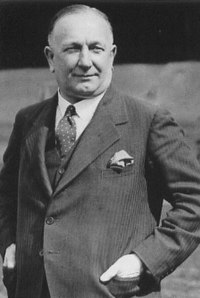 | |||
| Personal information | |||
|---|---|---|---|
| Date of birth | 19 January 1878 | ||
| Place of birth | Kiveton Park, Yorkshire, England | ||
| Date of death | 6 January 1934 (aged 55) | ||
| Place of death | Hendon, Middlesex, England | ||
| Position(s) | Inside forward | ||
| Senior career* | |||
| Years | Team | Apps | (Gls) |
| –1896 | Kiveton Park | ||
| 1896–1897 | Ashton North End | ||
| 1897 | Stalybridge Rovers | ||
| 1897–1898 | Rochdale | ||
| 1898–1899 | Grimsby Town | 10 | (4) |
| 1899 | Swindon Town[1] | 3 | (2) |
| 1899–1900 | Sheppey United | ||
| 1900–1901 | Worksop Town | ||
| 1901–1902 | Northampton Town[1] | 22 | (14) |
| 1902–1903 | Sheffield United | 21 | (2) |
| 1903–1905 | Notts County | 7 | (1) |
| 1904–1905 | → Northampton Town (loan) | ||
| 1905–1907 | Tottenham Hotspur[1] | 42 | (16) |
| 1907–1909 | Northampton Town | ||
| Managerial career | |||
| 1907–1912 | Northampton Town | ||
| 1912–1918 | Leeds City | ||
| 1921–1925 | Huddersfield Town | ||
| 1925–1934 | Arsenal | ||
| *Club domestic league appearances and goals | |||
Herbert Chapman (19 January 1878 – 6 January 1934) was an English football player and manager. Though he had an undistinguished playing career, he went on to become one of the most influential and successful managers in the early 20th century, before his sudden death in 1934. He is regarded as one of the game's greatest innovators.[2]
As a player, Chapman played for a variety of clubs, at Football League and non-League levels. His record was generally unremarkable as a player; he made fewer than 40 League appearances over the course of a decade and did not win any major honours. Instead, he found success as a manager, first at Northampton Town between 1908 and 1912, which he led to a Southern League title. This attracted the attention of larger clubs and he moved to Leeds City, where he started to improve the team's fortunes before the First World War intervened. After the war ended, City were implicated in an illegal payments scandal and were eventually disbanded. Chapman was initially banned from football but successfully appealed. He took over at Huddersfield Town, winning an FA Cup and two First Division titles in the period of four years.
In 1925, Arsenal successfully tempted Chapman to join them, and he led the club to its first ever silverware by winning one FA Cup and two First Division titles. His work at Arsenal resulted in their becoming the dominant team of the 1930s – they won five League titles and two FA Cups in the decade before the suspension of football due to the outbreak of the Second World War – but he did not live to see the entirety of his team's success, dying suddenly from pneumonia in 1934, at the age of 55.
He is credited with improving Arsenal. He introduced new tactics (the WM formation, which forms the core of most modern-day formations) and training techniques to the game and the use of physiotherapists. He led the team, rather than letting board members lead. He also used floodlighting and numbered shirts, entered European club competitions, and has received many posthumous honours in recognition.
- ^ a b c Appearances and goals are for the Southern League
- ^ "Herbert Chapman - The great innovator". Arsenal F.C. 10 May 2017. Archived from the original on 7 November 2017. Retrieved 24 September 2023.